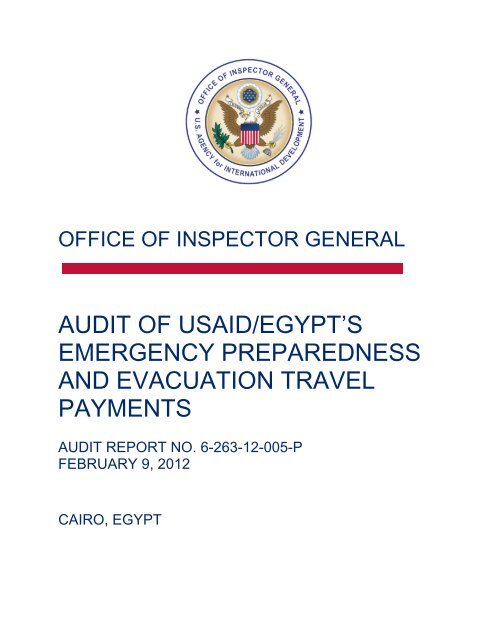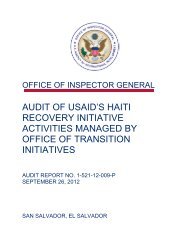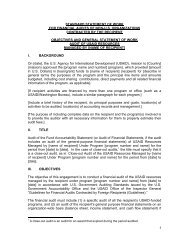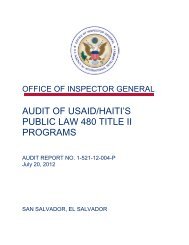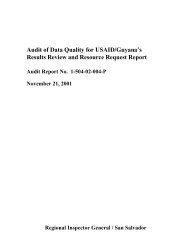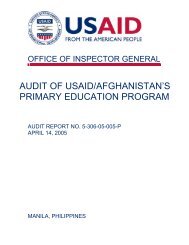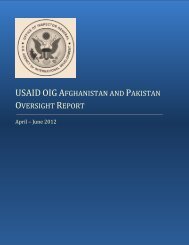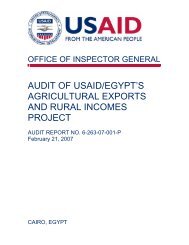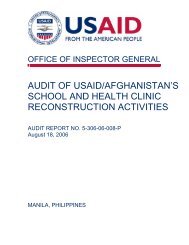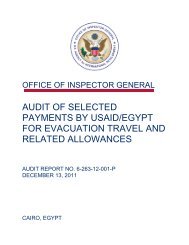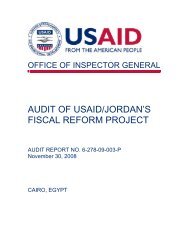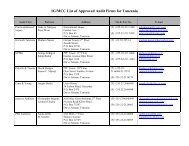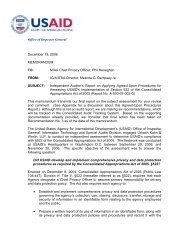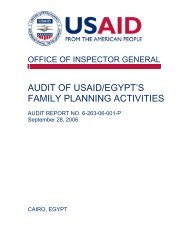Audit of USAID/Egypt's Emergency Preparedness and Evacuation ...
Audit of USAID/Egypt's Emergency Preparedness and Evacuation ...
Audit of USAID/Egypt's Emergency Preparedness and Evacuation ...
Create successful ePaper yourself
Turn your PDF publications into a flip-book with our unique Google optimized e-Paper software.
CONTENTS Summary <strong>of</strong> Results ................................................................................................................... 1 <strong>Audit</strong> Findings.............................................................................................................................4 <strong>USAID</strong>/Egypt Did Not Have Some Elements <strong>of</strong> a Continuity <strong>of</strong> Operations Plan ................... 4 <strong>USAID</strong>/Egypt Did Not Correctly Calculate <strong>and</strong> Pay Some <strong>Evacuation</strong> Benefits ..................... 6 <strong>USAID</strong>/Egypt Did Not Approve a Telecommuting Arrangement Properly ............................... 7 <strong>USAID</strong>/Egypt Did Not Pay Advances Appropriately ................................................................ 9 <strong>USAID</strong>/Egypt Employees Did Not Use the Required Government Travel Card .................... 11 <strong>USAID</strong>/Egypt Did Not Require Adequate Documentation for Some Reimbursement Requests............................................................................................................................... 12 <strong>USAID</strong>/Egypt Did Not Obtain Invoices for Intragovernmental Transactions ......................... 13 <strong>USAID</strong>/Egypt Employee Used the U.S. Military Postal Service Inappropriately for Unaccompanied Air Baggage ............................................................................................... 14 <strong>USAID</strong>/Egypt Did Not Ensure Timely Submission <strong>of</strong> Reimbursement Requests .................. 15 Evaluation <strong>of</strong> Management Comments................................................................................... 17 Appendix I—Scope <strong>and</strong> Methodology .................................................................................... 20 Appendix II—Management Comments ................................................................................... 22 Appendix III—Some Allowances Available for Evacuated Employees................................ 31AbbreviationsThe following abbreviations appear in this report:ADSDoSDSSRFYGAOGMRAM&IEOFMTDYUABAutomated Directives SystemDepartment <strong>of</strong> StateDepartment <strong>of</strong> State St<strong>and</strong>ardized Regulationsfiscal yearGovernment Accountability OfficeGovernment Management Reform Actmeals <strong>and</strong> incidental expensesOffice <strong>of</strong> Financial Managementtemporary duty travelunaccompanied air baggage
SUMMARY OF RESULTS U.S. State Department (DoS) employees <strong>and</strong> their families occasionally must be evacuatedfrom embassies in countries during war, terrorism, natural disasters, or disease outbreaks.These incidents also can affect <strong>USAID</strong> missions since they <strong>of</strong>ten are attached to embassies.According to a 2007 Government Accountability Office report, the scale <strong>of</strong> evacuations differs inscope <strong>and</strong> size; typically, they are “authorized or ordered departure[s] <strong>of</strong> staff <strong>and</strong>dependents.” 1 <strong>Evacuation</strong>s such as these happen a few times a year. Between March 2002<strong>and</strong> August 2007, DoS ordered 60 evacuations from overseas posts, <strong>of</strong> which 20 occurred inthe Middle East.The January 2011 revolution in the Arab Republic <strong>of</strong> Egypt prompted DoS to authorizenonemergency U.S. Embassy Cairo personnel 2 <strong>and</strong> dependents to go to the United States orother designated safe havens at the expense <strong>of</strong> the U.S. Government. The departmentauthorized this voluntary departure on January 30, 2011. However, on February 1, 2011, itupgraded the evacuation from an authorized departure to an ordered departure, which requiredall nonemergency personnel <strong>and</strong> dependents to leave the country immediately. Consequently,the U.S. Embassy Cairo evacuated 45 <strong>USAID</strong>/Egypt U.S. employees with 70 dependents to theUnited States or other designated safe havens. On April 29, 2011, DoS, in consultation with theU.S. Ambassador to Egypt, lifted the ordered evacuation, allowing all employees <strong>and</strong> theirdependents to return.At <strong>USAID</strong>/Egypt, two primary <strong>of</strong>fices were involved in functions associated with the evacuation.The Executive Office was responsible for coordinating with the Embassy to provide <strong>and</strong> verifyhuman resources information; ensuring the continuity <strong>of</strong> operations at the mission; preparingevacuation travel authorizations; <strong>and</strong> coordinating authorized travel for employees during theordered departure. The <strong>USAID</strong>/Egypt’s Office <strong>of</strong> Financial Management (OFM) was responsiblefor funding the travel authorizations <strong>and</strong> reviewing, processing, <strong>and</strong> reimbursing employees forallowable evacuation expenses. As <strong>of</strong> June 30, 2011, <strong>USAID</strong>/Egypt had reimbursed $962,400 3to employees <strong>and</strong> DoS for evacuation expenses.To help <strong>of</strong>fset added expenses incurred by evacuees, DoS authorized special allowances fortravel, subsistence expenses at safe haven locations, transportation, <strong>and</strong> some shipping costs.The evacuation entitlements are specified in the Department <strong>of</strong> State St<strong>and</strong>ardized Regulations(DSSR), Chapter 600, “Payments During an Ordered/Authorized Departure,” <strong>and</strong> aresummarized in Appendix III.The Regional Inspector General/Cairo added this audit to its fiscal year (FY) 2011 audit planafter identifying anomalies with some reimbursement requests during <strong>USAID</strong>/Egypt’s FY 2011Government Management Reform Act (GMRA) audit <strong>and</strong> the “<strong>Audit</strong> <strong>of</strong> Selected Payments by<strong>USAID</strong>/Egypt for <strong>Evacuation</strong> Travel <strong>and</strong> Related Allowances.” This audit also focused on themission’s plans <strong>and</strong> preparedness to address emergencies.1 “State Department: <strong>Evacuation</strong> Planning <strong>and</strong> Preparations for Overseas Posts Can be Improved,” GAO-08-23, October 19, 2007, page 10.2 Different agencies <strong>and</strong> departments, such as <strong>USAID</strong>/Egypt, are assigned under the U.S. Ambassador at the U.S. Embassy Cairo.3 In addition, <strong>USAID</strong>/Egypt processed 52 reimbursement requests <strong>and</strong> paid $222,600 <strong>of</strong> evacuation benefits to Regional Inspector General/Cairo staff members. This amount was excluded from the audit. 1
Although the mission performed quick-response evacuation actions commendably,<strong>USAID</strong>/Egypt can improve its continuity <strong>of</strong> operations plans to better prepare for emergencies.In addition, as a result <strong>of</strong> some unallowable evacuation benefits <strong>and</strong> miscalculations <strong>of</strong>expenses, <strong>USAID</strong>/Egypt paid unallowable costs <strong>of</strong> $4,175 4 <strong>and</strong> did not pay $1,111 in allowableexpenses. The audit identified the following issues that the mission will need to address:<strong>USAID</strong>/Egypt did not have some elements <strong>of</strong> a continuity <strong>of</strong> operations plan (page 4). <strong>USAID</strong>/Egypt did not correctly calculate <strong>and</strong> pay some evacuation benefits (page 6).<strong>USAID</strong>/Egypt did not approve a telecommuting arrangement properly (page 7). <strong>USAID</strong>/Egypt did not pay advances appropriately (page 9). <strong>USAID</strong>/Egypt employees did not use the required government travel card (page 11). <strong>USAID</strong>/Egypt did not require adequate documentation for some reimbursement requests (page 12). <strong>USAID</strong>/Egypt did not obtain invoices for intragovernmental transactions (page 13). <strong>USAID</strong>/Egypt employee used the U.S. Military Postal Service inappropriately (page 14). <strong>USAID</strong>/Egypt did not ensure timely submission <strong>of</strong> reimbursement requests (page 15).To address these issues, this audit recommends that <strong>USAID</strong>/Egypt:1. Develop <strong>and</strong> implement an internal control to update consolidated personally identifiableinformation for employees <strong>and</strong> dependents as needed, <strong>and</strong> submit it to the appropriateEmbassy personnel (page 6).2. Identify <strong>and</strong> document essential functions <strong>and</strong> activities, <strong>and</strong> determine the minimumresources needed to perform critical operations in an emergency (page 6).3. Determine the allowability <strong>of</strong> questioned costs valued at $4,175 <strong>and</strong> nonpayment <strong>of</strong> $1,111,<strong>and</strong> recover from or remit to the employees amounts deemed appropriate (page 7).4. Provide <strong>and</strong> document training to financial management employees on regulationsgoverning evacuation entitlements (page 7).5. Review <strong>and</strong> document the work produced by the employee for the 88 hours <strong>of</strong> regular dutyclaimed, determine the allowability <strong>of</strong> payments made, <strong>and</strong> collect any overpayments(page 8).4 Additionally, “<strong>Audit</strong> <strong>of</strong> Selected Payments by <strong>USAID</strong>/Egypt for <strong>Evacuation</strong> Travel <strong>and</strong> Related Allowances”(Report No. 6-263-12-001-P, December 13, 2011) identified $5,112 in unallowable costs.2
6. Develop, document, <strong>and</strong> implement mission procedures for obtaining appropriate approvalsfor any deviations from U.S. federal regulations regarding advances for evacuation travel(page 10).7. Document the availability <strong>of</strong> advances for U.S. direct-hire staff during evacuations in themission’s procedures on financial management advances <strong>and</strong> accounts payable (page 10).8. Include the requirement for the use <strong>of</strong> government-sponsored travel cards in Section 7 <strong>of</strong> theAID 5-8 Travel Authorization Form to remind employees <strong>of</strong> their financial managementresponsibilities (page 12).9. Issue a written reminder to all employees about the possible penalties for not following theguidelines requiring the use <strong>of</strong> the travel cards (page 12).10. Determine the type <strong>of</strong> <strong>of</strong>fense, administer the appropriate penalty, <strong>and</strong> document it in theappropriate mission or personnel file, if warranted (page 12).11. Provide <strong>and</strong> document training to financial management employees on retaining in themission’s electronic filing depository appropriate supporting documents for financialtransactions (page 13).12. Develop a checklist <strong>of</strong> relevant documents that financial management employees can use toverify the completeness <strong>of</strong> a travel voucher package before processing employeereimbursements (page 13).13. Revise <strong>and</strong> implement its intragovernmental transactions recording procedures to requirefinancial management employees to obtain, review, <strong>and</strong> maintain supporting documentationfor all intragovernmental transactions (page 14).14. When warranted, include in Section 7 <strong>of</strong> the AID 5-8 Travel Authorization Form guidanceindicating that use <strong>of</strong> the U.S. Military Postal Service for unaccompanied baggage isprohibited (page 15).15. Periodically remind all travelers that they must file a travel voucher within 5 business days <strong>of</strong>completing travel or every 30 calendar days during extended travel (page 16).16. Include in Section 7 <strong>of</strong> the AID 5-8 Travel Authorization Form the requirement to submit atravel reimbursement request within 5 business days after completing travel (page 16).Detailed findings are included in the following section. Appendix I contains information on thescope <strong>and</strong> methodology. Management comments are included in their entirety in Appendix II,<strong>and</strong> our evaluation <strong>of</strong> management comments is included on page 17.. 3
AUDIT FINDINGS <strong>USAID</strong>/Egypt Did Not HaveSome Elements <strong>of</strong> aContinuity <strong>of</strong> Operations PlanThe U.S. Government has published several directives to provide guidance on continuity <strong>of</strong>operations planning. In February 2008, the Department <strong>of</strong> Homel<strong>and</strong> Security published theFederal Continuity Directive 1, “Federal Executive Branch National Continuity Program,” toprovide direction for the development <strong>of</strong> continuity plans to address “no notice emergencies,including localized acts <strong>of</strong> nature, accidents, technological emergencies, <strong>and</strong> military or terroristattack-related incidents.” As defined in the directive, a continuity plan helps facilitate theperformance <strong>of</strong> essential functions before, during, <strong>and</strong> after an event to minimize disruptions <strong>of</strong>normal operations. Furthermore, requirements <strong>of</strong> a continuity plan include documented plans<strong>and</strong> procedures delineating essential functions; identifying a specific order <strong>of</strong> succession <strong>and</strong>delegation <strong>of</strong> authority; identifying human capital consideration; identifying <strong>and</strong> protecting vitalrecords <strong>and</strong> databases; identifying alternate operating facilities; <strong>and</strong> discussing the continuity <strong>of</strong>communications validated through tests, training, <strong>and</strong> exercises. The Federal ContinuityDirective 1, Annex I, “Vital Records Management,” provides guidance about the identification,protection, <strong>and</strong> availability <strong>of</strong> vital records <strong>and</strong> hard-copy documents, including <strong>of</strong>ficial personnelrecords <strong>and</strong> inventory records, among others. In addition, the Privacy Act <strong>of</strong> 1974 defines a“record” as any item, collection, or grouping <strong>of</strong> information about an individual that is maintainedby an agency that contains personally identifiable information. 5To prepare for the evacuation, <strong>USAID</strong>/Egypt <strong>of</strong>ficials compiled a list that included employees<strong>and</strong> dependents to be evacuated <strong>and</strong> identified essential employees who would remain at theirassigned duty station (post). According to the deputy executive <strong>of</strong>ficer at the time <strong>of</strong> theevacuation, the former deputy mission director assisted by communicating directly with <strong>USAID</strong><strong>of</strong>fice directors to get information on the employees <strong>and</strong> dependents that U.S. Embassy Cairowanted to evacuate. This information included the employees’ <strong>and</strong> dependents’ home <strong>of</strong> recordor desired safe haven location, emergency contact information, passport numbers, <strong>and</strong> currentlocations. Although certain personnel information was available in a shared post personneldatabase, mission <strong>of</strong>ficials could not come to the <strong>of</strong>fice because <strong>of</strong> the civil disruption, <strong>and</strong> theGovernment <strong>of</strong> Egypt blocked Internet service at employees’ homes. Therefore, <strong>USAID</strong>/Egypt<strong>of</strong>ficials contacted employees directly through telephone access provided by the U.S.Government to verify the information.During the evacuation, according to the executive <strong>of</strong>ficer, <strong>USAID</strong>/Egypt’s former deputy missiondirector also identified 7 <strong>of</strong> 12 departments as essential, <strong>and</strong>, after coordinating with Embassypersonnel, determined a reduced staffing level. Mission <strong>of</strong>ficials decided that nine U.S.employees 6 should remain at <strong>USAID</strong>/Egypt to perform essential functions.5 According to <strong>USAID</strong> guidance, personally identifiable information is any information an agencymaintains about an employee that includes, but is not limited to, name, address, telephone, e-mailaddresses, <strong>and</strong> any other descriptors; when this information is combined, it can identify the employee.Access to this information should be protected as required by the Privacy Act <strong>of</strong> 1974, as amended.6 The essential employees were the mission director, deputy mission director, executive <strong>of</strong>ficer, controller,<strong>and</strong> five <strong>of</strong>fice directors or assistant directors.4
At <strong>USAID</strong>/Egypt, six <strong>of</strong>fices have regional responsibilities 7 to provide services such asprocurement, legal, program management oversight, <strong>and</strong> financial functions for other missionsoperating in the Middle East <strong>and</strong> Asia, North Africa, <strong>and</strong> Europe. For example, <strong>USAID</strong>/Egypt’sOFM supports nine 8 other <strong>USAID</strong> missions with accounting, budgeting, financial analysis, <strong>and</strong>processing for some financial transactions. Underst<strong>and</strong>ably, because <strong>of</strong> the disruption causedby the evacuation <strong>and</strong> the limited number <strong>of</strong> employees at the mission, the OFM did not processfinancial transactions for Iraq, Pakistan, Afghanistan, <strong>and</strong> Sudan.<strong>USAID</strong>/Egypt’s Executive Office developed a mission policy on continuity <strong>of</strong> operations onSeptember 11, 2011, for the mission’s continuity <strong>of</strong> operations plan. However, that policy is acentralized source <strong>of</strong> compiled information about practices, plans, <strong>and</strong> procedures that<strong>USAID</strong>/Egypt will use or uses to prepare for emergencies; it is not a continuity <strong>of</strong> operationsplan. Such a plan may (1) provide critical information about the mission employees <strong>and</strong> theirdependents as a quick reference that contains contact information <strong>and</strong> other personallyidentifiable information in case <strong>of</strong> emergencies, <strong>and</strong> (2) identify essential mission functions <strong>and</strong>the staff needed to perform them. 9Responding to a question about the need for personally identifiable information about missionemployees, the executive <strong>of</strong>ficer said that since <strong>USAID</strong>/Egypt developed a summary <strong>of</strong> thisinformation during the evacuation, there was no need to update <strong>and</strong> maintain it because it couldbe developed anytime. However, the Embassy demonstrated the need to maintain this type <strong>of</strong>data during October <strong>and</strong> November 2011, when Embassy personnel requested <strong>and</strong> updatedpersonally identifiable information about the mission’s employees <strong>and</strong> their dependents.Consequently, <strong>USAID</strong>/Egypt was asked to verify <strong>and</strong> update its employee data in response toEmbassy personnel requests.Although the executive <strong>of</strong>ficer said some mission <strong>of</strong>ficials had considered functions the missionwould require in an emergency, <strong>USAID</strong>/Egypt had not documented essential <strong>of</strong>fice activities orthe minimum number <strong>of</strong> staff members needed to perform them. The executive <strong>of</strong>ficer saidmission <strong>of</strong>ficials did not predetermine essential <strong>of</strong>fice activities <strong>and</strong> resources because it wasbest to keep the identification <strong>of</strong> essential personnel flexible to allow <strong>of</strong>ficials to make decisionson functions needed by the mission.<strong>USAID</strong>/Washington’s Bureau for Management, Office <strong>of</strong> Management Services, provides theoversight for the agency’s continuity <strong>of</strong> operations plans for headquarters’ <strong>of</strong>fices. The bureau’semergency manager said that although <strong>USAID</strong>/Washington provides management oversight forits Washington <strong>of</strong>fices, the agency does not have staff assigned specifically to modify <strong>and</strong>simplify continuity <strong>of</strong> operations plans for overseas missions. According to the emergencymanager, <strong>USAID</strong> has guidance on information needed in a continuity <strong>of</strong> operations plan, butmissions do not have a st<strong>and</strong>ardized process for developing one, although some bureaus or<strong>of</strong>fices in Washington provide explicit instructions for missions or overseas <strong>of</strong>fices. As a result,<strong>USAID</strong>/Egypt follows the lead <strong>of</strong> its cognizant U.S. Embassy.7 These include the procurement, financial management, executive, <strong>and</strong> legal <strong>of</strong>fices; the Office <strong>of</strong> MiddleEast Programs; <strong>and</strong> the Regional Inspector General/Cairo. 8 Those missions are Afghanistan, Iraq, Lebanon, Morocco, Pakistan, Paris, Rome, Sudan, <strong>and</strong> Yemen. 9Any system <strong>of</strong> records developed or modified to track personally identifiable information should comply with the Privacy Act’s publication requirement at 5 U.S.C. 552a(e)(4) <strong>and</strong> any other legal requirements.5
Historically, many evacuations have occurred in the Middle East. Because frequent staffrotations can limit institutional memory at <strong>USAID</strong> missions, a continuity <strong>of</strong> operations plan withreadily available personally identifiable information about mission employees, essentialprocesses, <strong>and</strong> the requisite staffing needs is very important. Without a systematic process todocument time-sensitive emergency data in advance <strong>and</strong> to identify what must be done toensure continuity <strong>of</strong> operations, <strong>USAID</strong>/Egypt limits its preparedness <strong>and</strong> responsiveness duringemergencies. Consequently, the audit makes the following recommendations.Recommendation 1. We recommend that <strong>USAID</strong>/Egypt develop <strong>and</strong> implement aninternal control to update consolidated personally identifiable information for employees<strong>and</strong> dependents as needed, <strong>and</strong> submit it to the appropriate Embassy personnel.Recommendation 2. We recommend that <strong>USAID</strong>/Egypt identify <strong>and</strong> documentessential functions <strong>and</strong> activities, <strong>and</strong> the minimum resources needed to perform criticaloperations during emergencies.<strong>USAID</strong>/Egypt Did Not CorrectlyCalculate <strong>and</strong> Pay Some<strong>Evacuation</strong> BenefitsDSSR, Chapter 600, “Payments During an Ordered/Authorized Departure,” authorizes certainU.S. Government agencies operating in foreign areas to pay employees <strong>and</strong> their dependentsseveral benefits in the event <strong>of</strong> an evacuation from their posts. Some <strong>of</strong> the authorizedevacuation benefits are included in DSSR 631, “Travel Expense Allowances,” which governslocality per diem from a date <strong>of</strong> departure to a date <strong>of</strong> arrival at an <strong>of</strong>ficial safe haven; DSSR632, “Subsistence Expense Allowances,” which governs locality per diem for up to 180 daysfrom the date following arrival at an authorized safe haven; <strong>and</strong> DSSR 631 (b), “HouseholdEffects, Privately Owned Vehicle <strong>and</strong> Transportation Allowance,” which limits shipments <strong>of</strong>privately owned vehicles <strong>and</strong> reimbursements for transportation expenses. Appendix IIIsummarizes further details <strong>of</strong> these entitlements.<strong>USAID</strong>/Egypt’s OFM paid unallowable costs <strong>of</strong> $4,175 10 <strong>and</strong> did not pay $1,111 in allowableexpenses. These questioned costs were identified in 17 <strong>of</strong> 144 reimbursement requestssubmitted by 15 <strong>of</strong> the 41 U.S. employees. For example, this audit found that OFM reimbursedan employee $1,455 over the allowable lodging amount because the employee claimed lodgingat a special family composition rate to which the employee was not entitled. In the second case,the mission reimbursed an employee staying in the District <strong>of</strong> Columbia metropolitan area forlodging at a rate <strong>of</strong> $209 to $229 per night plus taxes when the maximum was $181 per nightplus taxes; OFM paid this employee $668 more than the maximum allowable lodging amount.In two other cases, OFM paid two employees unallowable costs totaling $722 in evacuationbenefits for meals <strong>and</strong> incidental expenses (M&IE) <strong>and</strong> for transportation because theemployees did not report directly to Washington, D.C., the <strong>of</strong>ficial safe haven location for all<strong>USAID</strong> employees. In a third case, although an employee reported to Washington, theemployee left to work remotely in New York State. According to <strong>USAID</strong>/Egypt’s former deputymission director, this employee worked for the mission remotely without an approvedtelecommuting arrangement. Consequently, OFM paid the employee $994 in unallowable costsfor M&IE. In another case, because <strong>of</strong> an oversight, OFM inadvertently did not pay an10 Additionally, the “<strong>Audit</strong> <strong>of</strong> Selected Payments by <strong>USAID</strong>/Egypt for <strong>Evacuation</strong> Travel <strong>and</strong> RelatedAllowances” (Report No. 6-263-12-001-P, December 13, 2011) identified $5,112 in unallowable costs.6
employee $410 for 1 day <strong>of</strong> evacuation benefits that included lodging, M&IE, <strong>and</strong> transportationallowances.Mission <strong>of</strong>ficials gave several reasons for the unallowable payments. First, mission <strong>of</strong>ficials saidthe regulations were complicated <strong>and</strong> not always clear. Voucher examiners <strong>and</strong> certifying<strong>of</strong>ficers who reviewed <strong>and</strong> approved the employees’ reimbursement requests lacked anyinstitutional knowledge about the application <strong>of</strong> the regulations. Second, in addition to theinternal controls established for reviewing reimbursement requests, the Executive Office <strong>and</strong>OFM formed a focus group to discuss the ambiguities <strong>of</strong> the evacuation regulations <strong>and</strong> areas inwhich management could use its discretion in interpreting the guidance. As part <strong>of</strong> this process,the former controller clarified <strong>and</strong> approved many <strong>of</strong> the lodging issues identified toaccommodate employees <strong>and</strong> their dependents during the evacuation to the United States.Third, local employees living in Cairo <strong>and</strong> surrounding cities indicated that they were personallyaffected by the unpredictable security situation during the revolution, <strong>and</strong> that adversely affectedtheir job performance. Consequently, errors in reviewing <strong>and</strong> approving reimbursementsrequests occurred.Although an unscheduled evacuation is stressful, financial management <strong>of</strong>ficials are stewards <strong>of</strong>government funds <strong>and</strong> are responsible for ensuring that payments are correct <strong>and</strong> paid inaccordance with established regulations. Although the value <strong>of</strong> the unallowablereimbursements or miscalculations would not necessarily be material to the Agency’s financialstatement, evacuation payments have a high inherent risk given the infrequency <strong>of</strong> evacuations.Consequently, the audit makes the following recommendations.Recommendation 3. We recommend that <strong>USAID</strong>/Egypt determine the allowability <strong>of</strong>questioned costs valued at $4,175 <strong>and</strong> nonpayment <strong>of</strong> $1,111, <strong>and</strong> recover from or remitto the employees amounts as deemed appropriate.Recommendation 4. We recommend that <strong>USAID</strong>/Egypt provide <strong>and</strong> document trainingto financial management employees about regulations governing evacuation entitlements.<strong>USAID</strong>/Egypt Did Not Approvea Telecommuting ArrangementProperlyTelecommuting is a flexible work arrangement that allows an employee to perform authorizedduties <strong>and</strong> responsibilities from an approved worksite other than the location from which theemployee would usually work. <strong>USAID</strong>’s Automated Directives System (ADS) 405,“Telecommuting,” 11 requires supervisors to approve an employee’s individual request totelecommute. Supervisors must have a clear underst<strong>and</strong>ing <strong>and</strong> agreement about theemployee’s alternative workplace, work days <strong>and</strong> hours, <strong>and</strong> the work to be performed. Duringthe evacuation, as indicated on the <strong>of</strong>ficial DoS evacuation order, U.S. employees were requiredto report to <strong>USAID</strong> headquarters in Washington, D.C.11 ADS 405, “Telecommuting,” was superseded by ADS 405, “Telework,” revised May 2011. However,ADS 405, “Telecommuting,” was the effective policy during the audit period.7
As a basis for approving an employee’s time <strong>and</strong> attendance information, GAO publishedMaintaining Effective Control over Employee Time <strong>and</strong> Attendance Reporting” 12 According toPart I, “Alternative Workspace Arrangements,” supervisors are required to obtain reasonableassurance that employees working at remote sites are working when scheduled, <strong>and</strong> that time<strong>and</strong> attendance information is accurate.An employee claimed, <strong>and</strong> the time <strong>and</strong> attendance certifying <strong>of</strong>ficer approved, 88 hours <strong>of</strong>regular duty time in <strong>USAID</strong>’s <strong>of</strong>ficial time <strong>and</strong> attendance system for hours worked remotely inNew York State from February 4 to 28, 2011. However, the former deputy mission director, asthe employee’s immediate supervisor, did not approve a telecommuting arrangement, <strong>and</strong> theemployee was not entitled to certain evacuation benefits while living in New York State, asdiscussed on page 6 <strong>of</strong> this report.The employee planned to resign from <strong>USAID</strong> <strong>and</strong> begin employment with an organization inNew York State. <strong>USAID</strong>/Egypt’s Executive Office signed a separation travel authorization fortravel to the United States for this employee <strong>and</strong> dependents effective February 12, 2011.However, the executive <strong>of</strong>ficer approved the employee’s request to stay on the payroll fromFebruary 12 to 28, 2011, to help the staff member assigned to replace the employee.One <strong>of</strong> <strong>USAID</strong>/Egypt’s certifying <strong>of</strong>ficers notified the resigning employee via e-mail that all<strong>USAID</strong> employees are reimbursed for subsistence expenses based on the Washington, D.C.,rate <strong>and</strong> requested that the employee provide documents to support payment for a differentlocation. However, the employee told the <strong>of</strong>ficer that <strong>USAID</strong>/Egypt’s executive <strong>of</strong>ficer <strong>and</strong> a<strong>USAID</strong>/Washington human resources specialist decided that because <strong>of</strong> the pending agencyseparation, it did not make sense to continue working in Washington, D.C.None <strong>of</strong> the <strong>USAID</strong>/Egypt <strong>of</strong>ficials provided the audit team with a valid reason for the lack <strong>of</strong> anapproved telecommuting arrangement. From Egypt, the executive <strong>of</strong>ficer communicated withthe telecommuting employee during this time but was not aware that the employee was workingremotely. In addition, the employee’s successor stated that the employee worked throughoutthe period by telephone <strong>and</strong> Internet, <strong>and</strong> that the employee’s knowledge <strong>of</strong> <strong>USAID</strong>’s programswas invaluable. <strong>USAID</strong>/Egypt’s former deputy mission director, who also remained in Egyptduring the evacuation, certified the employee’s time <strong>and</strong> attendance records but commentedthat no telecommuting arrangement had been approved. The former deputy mission directoralso had no communication with the employee after the employee evacuated from Egypt onJanuary 31, 2011.Although <strong>USAID</strong> supports <strong>and</strong> encourages telecommuting arrangements, a supervisor mustapprove these alternative work arrangements <strong>and</strong> properly account for an employee’sproductivity while working remotely. As a certifying <strong>of</strong>ficial for an employee’s time <strong>and</strong>attendance record, the supervisor is inherently responsible for ensuring the accuracy <strong>of</strong> theserecords. Accordingly, the audit makes the following recommendation.Recommendation 5. We recommend that <strong>USAID</strong>/Egypt review <strong>and</strong> document the workproduced by the employee for the 88 hours <strong>of</strong> regular duty claimed, determine theallowability <strong>of</strong> payments made, <strong>and</strong> collect any overpayments.12 GAO Report 03-352G, “Maintaining Effective Control over Employee Time <strong>and</strong> Attendance Reporting,”January 2003.8
<strong>USAID</strong>/Egypt Did Not PayAdvances AppropriatelyAccording to DSSR 615, “Advance Payments,” an employee may be paid in advance <strong>of</strong> anormal payday when, in the opinion <strong>of</strong> the authorizing <strong>of</strong>ficer, payment is required to help defrayimmediate expenses due to the evacuation <strong>of</strong> an employee or dependents or both. In addition,according to DSSR 617, “Amount <strong>of</strong> Advance Payment,” the advance payment shall be basedon the rate <strong>of</strong> compensation including any allowances or post differential to which an employeewas entitled immediately before the issuance <strong>of</strong> the evacuation order. The total advancepayment to an employee may not exceed 30 days <strong>of</strong> the employee’s rate <strong>of</strong> compensationincluding any allowances or post differential to which an employee was entitled immediatelyprior to the issuance <strong>of</strong> the evacuation order. DSSR 617.2 (b) includes guidance that allows<strong>of</strong>ficials to provide an advance payment within 30 days <strong>of</strong> the evacuation order. According toDSSR 642, “Approval Procedures,” an agency may deviate from the regulation but must receiveprior approval from the Secretary <strong>of</strong> State before implementation.In an e-mail sent February 9, 2011, <strong>USAID</strong>/Egypt’s OFM <strong>of</strong>ficials instructed employees torequest advance payments for lodging only <strong>and</strong> did not mention an expiration date for requests.On April 11, 2011, one employee requested an advance <strong>of</strong> $3,156 for M&IE <strong>and</strong> transportationallowances, as shown in the following table.<strong>USAID</strong>/Egypt’s OFM made eight advance payments to employees totaling $42,281 to financeimmediate evacuation expenses. However, it paid seven <strong>of</strong> them after March 2, 2011, morethan 30 days after the authorized evacuation on January 30, 2011, <strong>and</strong> did not get DoSapproval, as required. Furthermore, <strong>USAID</strong>/Egypt provided advance payments to oneemployee that exceeded the allowable limit by $8,074. The table below shows the advancepayments made.9
Advance Payments to Employees (audited)Amount PaymentEmployee’sAdvance Advance Total by Exceeding Provided<strong>Audit</strong>Reason forPayment Amount Employee Allowable beforeIdentifyingAdvanceDate ($) ($) Amount March 2,Number($) 201117 3/25/2011 7,689 No Lodging17 4/13/2011 10,327 * No Lodging17 5/11/2011 2,177 20,193 8,074 No Lodging4 2/14/2011 5,430 Yes Lodging4 3/16/2011 5,430 No Lodging4 4/6/2011 5,430 16,290 n/a No Lodging11 5/3/2011 3,156 3,156 n/a NoM&IE <strong>and</strong>TravelAllowances6 4/1/2011 2,642 2,642 n/a No LodgingTotal 42,281 42,281 8,074* Advance payment was also tested as part <strong>of</strong> the “<strong>Audit</strong> <strong>of</strong> Selected Payments by<strong>USAID</strong>/Egypt for <strong>Evacuation</strong> Travel <strong>and</strong> Related Allowances” (Report No. 6-263-12-001-P),December 13, 2011.According to a financial management <strong>of</strong>ficer, <strong>USAID</strong>/Egypt made a management decision toprovide employees with advance payments for lodging because <strong>of</strong> the unplanned displacement<strong>and</strong> the financial burden <strong>of</strong> paying lodging expenses before the mission could process <strong>and</strong>reimburse allowable costs. In addition, the voucher examiners <strong>and</strong> certifying <strong>of</strong>ficersresponsible for reviewing <strong>and</strong> approving payments stated that they were not aware that theadvance payments were allowable only for a specific time because these decisions were madeby the former mission controller. The financial management <strong>of</strong>ficer did not <strong>of</strong>fer an explanationfor providing advance payments for M&IE <strong>and</strong> transportation expenses that should not havebeen paid <strong>and</strong> that were not mentioned in the mission’s February 9, 2011, e-mail to employees.Although advance payments were important to assist employees <strong>and</strong> dependents withimmediate, unplanned expenses incurred because <strong>of</strong> the evacuation, <strong>USAID</strong>/Egypt must followregulations <strong>and</strong> seek the appropriate approval to deviate from requirements. Since adhering tothis regulation helps prevent misappropriation <strong>of</strong> government funds <strong>and</strong> provide some protectionto the Agency against fraud, waste, <strong>and</strong> abuse, the audit makes the following recommendations.Recommendation 6. We recommend that <strong>USAID</strong>/Egypt develop, document, <strong>and</strong>implement mission procedures for obtaining appropriate approvals for any deviationsfrom U.S. federal regulations regarding advances for evacuation travel.Recommendation 7. We recommend that <strong>USAID</strong>/Egypt document the availability <strong>of</strong>advances for U.S. direct-hire staff during evacuations in the mission’s procedures onfinancial management advances <strong>and</strong> accounts payable.10
<strong>USAID</strong>/Egypt Employees Did NotUse the Required GovernmentTravel Card<strong>USAID</strong>’s ADS 633.3.3, “Government-Sponsored Travel Card,” states that Public Law 105–264,dated October 19, 1998, requires the m<strong>and</strong>atory use <strong>of</strong> government-sponsored travel cards for<strong>of</strong>ficial government travel by employees. All U.S. direct-hire employees <strong>and</strong> personal servicecontractors who travel on <strong>of</strong>ficial Agency business must have a travel card <strong>and</strong> are required touse it to pay for authorized travel expenses, including lodging <strong>and</strong> meals. As stated in theguidance, when requesting reimbursement for expenses, if a traveler did not use the card fortravel-related expenses, the traveler must explain why in the comments section <strong>of</strong> theassociated request for reimbursement.Section 7 <strong>of</strong> <strong>USAID</strong>’s Request <strong>and</strong> Authorization <strong>of</strong> Official Travel (Travel Authorization Form),document number AID 5-8, includes a section for an itinerary, the purpose <strong>of</strong> travel, anyauthorizations, <strong>and</strong> special notes providing the basis for specific travel entitlements <strong>and</strong>requirements that <strong>USAID</strong> <strong>of</strong>ficials can use. In the event that employees do not follow theregulations, such as ADS 633.3.3, “Government-Sponsored Travel Card,” <strong>of</strong>ficials may assess apenalty for <strong>of</strong>fenses. As authorized by ADS 487, “Disciplinary <strong>and</strong> Adverse Actions Based UponEmployee Misconduct – Civil Service” dated November 6, 2009, the Table <strong>of</strong> Offenses <strong>and</strong>Penalties lists some commonly identified <strong>of</strong>fenses <strong>and</strong> provides some guidance on whatpenalties apply for violations <strong>of</strong> administrative regulations. It also includes a section onmiscellaneous <strong>of</strong>fenses that do not require penalties.At least nine 13 <strong>USAID</strong>/Egypt employees did not use their government-issued travel card forauthorized travel expenses while on evacuation status. Instead, they used personal credit cardsto pay expenses for lodging <strong>and</strong> other expenses. Further, at least one <strong>of</strong> the nine employeeswho received a cash advance to pay for lodging still used a personal credit card. None <strong>of</strong> thenine employees annotated their reimbursement requests, as required, to explain why they didnot use the travel card.<strong>USAID</strong>/Egypt’s Executive Office did not include on the travel authorization form the requirementto use the government-sponsored credit card, <strong>and</strong> employees provided various reasons for notusing their cards. One said that during the chaos <strong>of</strong> the situation, the card was left inadvertentlyat the <strong>of</strong>fice in Egypt, <strong>and</strong> others said they forgot to use their cards. In one case, an employeewho left the travel card in Egypt did not ask for a replacement because neither DoS regulationsnor <strong>USAID</strong>/Egypt’s Executive Office’s evacuation travel authorization stated that a travel cardwas required for evacuation travel expenses. In two cases, the employees did not have activetravel cards.Although some employees may have left travel cards in Egypt or may not have had them at thetime <strong>of</strong> the evacuation, employees had the option <strong>of</strong> contacting the Financial Policy <strong>and</strong> SupportDivision for a replacement travel card to use to charge allowable evacuation expenses.According to division staff members, an employee could have received a replacement card inthe Washington, D.C., area within 3 to 4 business days.Not using the required travel card not only violates <strong>USAID</strong>’s policy, but also reduces the rebate13 “<strong>Audit</strong> <strong>of</strong> Selected Payments by <strong>USAID</strong>/Egypt for <strong>Evacuation</strong> Travel <strong>and</strong> Related Allowances” (ReportNo. 6-263-12-001-P, December 13, 2011) identified another exception.11
<strong>USAID</strong> was authorized to reimburse DoS for the air transport services to safe haven locations.As a result, <strong>USAID</strong>/Egypt incurred the costs as intragovernmental transactions valued at$81,813. Although DoS provided services <strong>and</strong> billed the mission, <strong>USAID</strong>/Egypt did not obtainthe vendor receipts or invoices as support documentation for nine intragovernmentaltransactions valued at $24,658. To support the bills for these transactions, the mission provideda DoS report titled Regional Financial Management System – Disbursing, which contained adescription <strong>of</strong> each charge, the amount, <strong>and</strong> the travel authorization number assigned by<strong>USAID</strong>/Egypt. However, a receipt showing the employee’s name <strong>and</strong> charges incurred for theservice was not included in the supporting documents.Moreover, because <strong>of</strong> errors valued at $23,270 in an intragovernmental payment that DoSmade on behalf <strong>of</strong> <strong>USAID</strong>/Egypt in May 2011, the mission requested additional supportingdocuments that included the vendor receipts. Although the <strong>USAID</strong>/Egypt Executive Office hadprovided DoS with a list <strong>of</strong> employee names <strong>and</strong> the obligation numbers, DoS mistakenly placedseveral employees’ charges on a single travel authorization. After the mission reviewed thevendor receipts that included the employee’s name <strong>and</strong> service costs, <strong>USAID</strong>/Egypt allocated$17,710 <strong>of</strong> the $23,270 to nine different travel authorizations. However, the mission did notobtain a vendor receipt for the remaining $5,559 in charges incurred on behalf <strong>of</strong> <strong>USAID</strong>/Egypt.According to <strong>USAID</strong>/Egypt’s chief accountant, the mission is not required to obtain or maintainsupporting documentation for these transactions except to recognize which obligation to charge.Further, according to the chief accountant, the mission usually asks for additional supportingdocumentation when the amount charged to a travel authorization exceeds the amountobligated for the travel authorization in the mission’s accounting system.<strong>USAID</strong>/Egypt is an independent organization with a responsibility to get <strong>and</strong> maintain sufficientdocumentation to support all financial transactions. A mission’s due diligence in reviewing <strong>and</strong>researching questionable data, which results in correcting entries, illustrates the importance <strong>of</strong>obtaining sufficient documentation for all financial transactions. Financial <strong>of</strong>ficials have afiduciary responsibility to U.S. taxpayers to account for government funds. Consequently, thisaudit makes the following recommendation.Recommendation 13. We recommend that <strong>USAID</strong>/Egypt revise <strong>and</strong> implement itsintragovernmental transactions recording procedures to require financial managementemployees to obtain, review, <strong>and</strong> maintain supporting documentation for allintragovernmental transactions.<strong>USAID</strong>/Egypt Employee Used theU.S. Military Postal ServiceInappropriatelyDSSR 631, “Travel Expense Allowances,” gives evacuees an air freight allowance, referred toas unaccompanied air baggage (UAB), when traveling between assigned posts. Evacuees arepermitted an air freight allowance starting at 250 pounds with additional weight permitted basedon the evacuee’s family size. Accordingly, 14 Foreign Affairs Manual 742.4-1.c <strong>and</strong> 14 ForeignAffairs Manual 751.3.b state that an employee (or anyone acting on employee’s behalf) may notuse a Military Postal Service or the diplomatic post <strong>of</strong>fice to ship any UAB to a post abroad.Rather, UAB should be transported using contracted commercial shipping companies.Moreover, although ADS 522.5.2, “Travel Authorizations,” does not have specific languageregarding the use <strong>of</strong> the Military Postal Services, in Section 7 <strong>of</strong> <strong>USAID</strong>’s Request <strong>and</strong>14
Authorization <strong>of</strong> Official Travel (Travel Authorization Form), document number AID 5-8, asection exists to document an itinerary, the purpose <strong>of</strong> travel, any authorizations, <strong>and</strong> specialnotes.Despite the prohibition on the use <strong>of</strong> the Military Postal Service for UAB, one senior missionemployee claimed <strong>and</strong> was paid $47 for shipping costs incurred when mailing items fromanother <strong>USAID</strong> mission to <strong>USAID</strong>/Egypt in lieu <strong>of</strong> appropriately shipping the UAB using anauthorized shipper. Inappropriate use <strong>of</strong> the Military Postal Service for shipping UAB was notedalso in another audit, <strong>and</strong> <strong>USAID</strong>/Egypt paid the shipping costs claimed by the employee. 15Although payment <strong>of</strong> the $47 claim was not authorized, <strong>USAID</strong> <strong>of</strong>ficials justified this cost bynoting that the Military Postal Service was used because it saved the mission money.The use <strong>of</strong> the Military Postal Service by <strong>USAID</strong> personnel is a privilege <strong>and</strong> not a right. It is<strong>USAID</strong>/Egypt’s responsibility to ensure that its employees do not abuse their Military PostalService privileges <strong>and</strong> use them in a way that is consistent with the established policies <strong>and</strong>agreements. Accordingly, this audit makes the following recommendation.Recommendation 14. We recommend that <strong>USAID</strong>/Egypt include guidance regardingthe prohibited use <strong>of</strong> the U.S. Military Postal Service for unaccompanied baggage inSection 7 <strong>of</strong> the AID 5-8 Travel Authorization Form, when warranted.<strong>USAID</strong>/Egypt Did Not EnsureTimely Submission <strong>of</strong>Reimbursement RequestsSeveral <strong>USAID</strong> regulations address travel <strong>and</strong> related expenses. ADS 522.5.2, “TravelAuthorizations,” requires an employee to submit a reimbursement request within 5 businessdays after completing travel. ADS 633.3.5, “Travel Voucher Processing Requirements,”requires employees to submit a reimbursement request within 5 business days after completingtravel when travelers arrive at their post or every 30 calendar days during extended travel.Section 7 <strong>of</strong> <strong>USAID</strong>’s Request <strong>and</strong> Authorization <strong>of</strong> Official Travel, document number AID 5-8,includes a section for special notes, providing the basis for specific travel entitlements <strong>and</strong>requirements that <strong>USAID</strong> <strong>of</strong>ficials can use.On some travel authorizations, 16 <strong>USAID</strong>/Egypt’s Executive Office requires travelers to submit areimbursement request within 5 business days following travel completion. However, more than4 months after the evacuation was lifted on April 29, 2011, two <strong>USAID</strong>/Egypt <strong>of</strong>fice directors hadnot submitted reimbursement requests for expenses incurred by their dependents during thelast 30 days <strong>of</strong> the evacuation. In both cases, the employees returned to post before the end <strong>of</strong>the evacuation, <strong>and</strong> their dependents remained at designated safe havens until DoS lifted theevacuation. One employee received an advance <strong>of</strong> $3,156 in May 2011, as discussed on page9 <strong>of</strong> this report. However, the employee did not complete <strong>and</strong> provide a reimbursement requestto the OFM for processing until September 2011, during this audit.Both employees said they had not submitted their reimbursement requests to the OFM within 515 <strong>USAID</strong>/Egypt paid an employee $207 for Military Postal Service shipping costs as documented in<strong>USAID</strong>/Egypt’s FY 2011 GMRA audit. In response to the GMRA audit, <strong>USAID</strong>/Egypt indicated that a notice <strong>of</strong> collection would be issued to the employee.16 These include authorizations for rest <strong>and</strong> recuperation <strong>and</strong> home leave. 15
days after their dependents’ travel was completed because <strong>of</strong> other workload dem<strong>and</strong>s or apersonal oversight. Through their regular review <strong>of</strong> unliquidated advances, <strong>USAID</strong>/Egyptfinancial management <strong>of</strong>ficials noticed that the employee who received the advance had notsubmitted a reimbursement request <strong>and</strong> asked that employee to do so. However, they did notfollow up on the second outst<strong>and</strong>ing reimbursement request until responding to the audit‘sinquiries. OFM <strong>of</strong>ficials did not respond to requests for information on what steps they havetaken to ensure evacuation reimbursement requests are submitted on time.To ensure unspent travel funds can be reallocated to other mission priorities, <strong>USAID</strong>/Egypt mustensure that its employees submit reimbursement requests in a timely manner. When a requestis needed to liquidate a travel advance, timely submissions become more important so that themission can accurately account for its funds <strong>and</strong> use limited financial resources properly.Accordingly, this audit makes the following recommendations.Recommendation 15. We recommend that <strong>USAID</strong>/Egypt periodically remind alltravelers that they must file a travel voucher within 5 business days <strong>of</strong> completion <strong>of</strong>travel or every 30 calendar days during extended travel.Recommendation 16. We recommend that <strong>USAID</strong>/Egypt include the requirement tosubmit a travel reimbursement request within 5 business days after travel completion inSection 7 <strong>of</strong> the AID 5-8 Travel Authorization Form to remind employees <strong>of</strong> their financialmanagement responsibilities.16
EVALUATION OF MANAGEMENTCOMMENTSIn response to the draft report, <strong>USAID</strong>/Egypt <strong>of</strong>ficials agreed with eight recommendations,partially agreed with one, <strong>and</strong> disagreed with the remaining seven. On the basis <strong>of</strong> ourevaluation <strong>of</strong> <strong>USAID</strong>/Egypt’s management comments, management decisions have beenreached on Recommendations 2, 4, 5, 6, 11, 12, <strong>and</strong> 15. No management decisions have beenreached on Recommendations 1, 3, 7, 8, 9, 10, 13, 14, <strong>and</strong> 16. In addition, <strong>USAID</strong>/Egypt tookfinal action on Recommendations 2, 5, <strong>and</strong> 15.Recommendation 1. <strong>USAID</strong>/Egypt did not make a management decision to develop anymanagement controls to ensure employee <strong>and</strong> dependent data is updated with changescommunicated to the appropriate Embassy personnel. Although mission <strong>of</strong>ficials agreed thatthe information was critical, they did not agree to implement any internal control activities toupdate or verify personnel <strong>and</strong> dependent data more frequently than quarterly or in response toU. S. Embassy Cairo requests. Therefore, no management decision has been reached on thisrecommendation.Recommendation 2. <strong>USAID</strong>/Egypt agreed to undertake an after-action review to identifyadministrative, financial management, program, procurement, <strong>and</strong> some technical supportneeded to operate during an ordered departure by April 30, 2012. After submitting itscomments on January 16, <strong>USAID</strong>/Egypt took corrective action. Consequently, final action hasbeen taken on this recommendation.Recommendation 3. Mission <strong>of</strong>ficials agreed to determine the allowability <strong>of</strong> questioned costsvalued at $4,175 <strong>and</strong> nonpayment <strong>of</strong> $1,111 that <strong>of</strong>ficials will need to recover from or remit toemployees by April 30, 2012. However, until <strong>USAID</strong>/Egypt identifies the amounts to berecovered or remitted, a management decision has not been reached on this recommendation.Recommendation 4. <strong>USAID</strong>/Egypt plans to conduct training on evacuation benefits by April 30,2012. Accordingly, a management decision has been reached on this recommendation.Recommendation 5. Mission <strong>of</strong>ficials formed a review board to analyze the employee’s work<strong>and</strong> to determine the allowability <strong>of</strong> payments made for 88 hours <strong>of</strong> regular duty claimed afterthe evacuation <strong>and</strong> before the employee separated from <strong>USAID</strong>. After receiving the reviewboard’s analysis, <strong>USAID</strong>/Egypt decided not to collect overpayments from the former employee.Based on RIG/Cairo’s review <strong>of</strong> documents provided to show that the employee performed workduring this period, final action has been taken on this recommendation.Recommendation 6. <strong>USAID</strong>/Egypt agreed to update its internal accounts payable proceduresto clarify that any deviation from the governing regulation can be made based only on theprocedures contained in the regulation or other relevant guidance by April 30, 2012.Accordingly, a management decision has been reached on the recommendation.Recommendation 7. <strong>USAID</strong>/Egypt partially agreed to document advances available to U. S.direct-hire staff during evacuations in the mission’s procedures on financial managementadvances <strong>and</strong> accounts payable. The mission plans to update its accounts payable procedures17
to refer to the applicable Federal Travel Regulation on travel advances. However, <strong>USAID</strong>/Egyptdid not indicate plans to incorporate in its procedures the requirements <strong>of</strong> DSSR 615 <strong>and</strong> 617,governing advances to U.S. direct-hire employees during an evacuation. Accordingly, amanagement decision has not been reached on this recommendation.Recommendation 8. <strong>USAID</strong>/Egypt did not agree to include in Section 7 <strong>of</strong> the AID 5-8 travelauthorization form the requirement for the use <strong>of</strong> government-sponsored travel cards. While<strong>of</strong>ficials acknowledged the importance <strong>of</strong> reminding mission staff to use the cards, <strong>of</strong>ficials didnot agree with the specific recommendation. Instead, <strong>of</strong>ficials plan to issue a summary afteractionreview as a mission notice that will include this issue. While such a notice can remindcurrent staff <strong>of</strong> the requirement, it may not work since <strong>USAID</strong>’s mobile workforce frequentlytransfers in <strong>and</strong> out <strong>of</strong> missions worldwide <strong>and</strong> may require a more permanent reminder.Section 7 <strong>of</strong> the AID 5-8 travel authorization takes on increased significance during anevacuation. While in an evacuation status, it is not unusual for employees to focus on theirfundamental physiological <strong>and</strong> security needs <strong>and</strong> those <strong>of</strong> their family members. Including<strong>USAID</strong> financial management requirements on the use <strong>of</strong> the government-sponsored travel cardon the evacuation travel authorization would help eliminate confusion about its required use fortravel expenses. Consequently, a management decision has not been reached on thisrecommendation.Recommendation 9. <strong>USAID</strong>/Egypt did not agree to issue a reminder to all employees about thepossible penalties for not using the government-sponsored travel card because <strong>of</strong>ficials believethat the application <strong>of</strong> any rules or penalties related to the nonuse <strong>of</strong> the card is outside theirauthority. Unlike some other federal agencies, <strong>USAID</strong>’s regulation on travel card use is silenton any penalties for nonuse. However, it is well within the authority <strong>of</strong> <strong>USAID</strong>/Egypt <strong>of</strong>ficials to,at a minimum, publicize the range <strong>of</strong> disciplinary actions available to supervisors to correctunacceptable conduct; actions range from oral admonishment or discussions about theexpected use <strong>of</strong> the card to more severe actions such as suspension or separation for cause.RIG/Cairo believes that publicizing the possible penalties for not following the guidelines woulddecrease the possibility that employees would ignore the rules. Consequently, a managementdecision has not been reached on this recommendation.Recommendation 10. <strong>USAID</strong>/Egypt did not agree to determine the type <strong>of</strong> <strong>of</strong>fense constitutedby the nonuse <strong>of</strong> the government-sponsored travel card, administer the appropriate penalty, <strong>and</strong>document it in the appropriate mission personnel file, as warranted. <strong>USAID</strong>/Egypt supervisorsmay initiate disciplinary action, when warranted, against all employees regardless <strong>of</strong> theirclassification system—Foreign Service or other. Moreover mission supervisors also have theauthority to admonish a Foreign Service employee orally as a disciplinary action. Disciplinaryactions should be consistent <strong>and</strong> equitable for comparable actions in comparable cases basedon the severity <strong>and</strong> recurring nature <strong>of</strong> an infraction. RIG/Cairo would expect that anydisciplinary action other than oral admonition would be in consultation <strong>and</strong> agreement withcognizant <strong>USAID</strong> <strong>of</strong>ficials responsible for human resources or employee <strong>and</strong> labor relationsoversight. Consequently, a management decision has not been reached on thisrecommendation.Recommendation 11. <strong>USAID</strong>/Egypt, which is implementing a paperless payment process,agreed to train its financial management employees in maintaining electronic records to supportfinancial transactions by April 30, 2012. Officials expect that the mission will be able to retainentire voucher packages in its electronic filing depository. Therefore, a management decisionhas been reached on this recommendation.18
Recommendation 12. <strong>USAID</strong>/Egypt agreed to develop a checklist <strong>of</strong> relevant documents thatfinancial management employees can use to verify the completeness <strong>of</strong> a travel voucherpackage before processing employee reimbursements. Financial management <strong>of</strong>ficials plan toupdate the mission’s internal payment procedures so that voucher examiners confirm that avalid obligation exists before submitting a travel voucher to a certifying <strong>of</strong>ficer. Consequently, amanagement decision has been reached on the recommendation.Recommendation 13. Mission <strong>of</strong>ficials did not agree to revise <strong>and</strong> implement itsintragovernmental transactions recording procedures to require financial management staff toobtain, review, <strong>and</strong> maintain supporting documentation for this transaction type. Althoughmission <strong>of</strong>ficials solicited feedback on a proposed solution from the Office <strong>of</strong> the Chief FinancialOfficer, they did not receive a response. Consequently, a management decision has not beenmade.Recommendation 14. <strong>USAID</strong>/Egypt did not agree to include guidance in Section 7 <strong>of</strong> the AID5-8 Travel Authorization Form prohibiting use <strong>of</strong> the U. S. Military Postal Service forunaccompanied baggage. Although mission <strong>of</strong>ficials agreed with the finding, they disagreedwith the specific remedy included in the recommendation. The mission plans to publish amission notice on the matter <strong>and</strong> to reissue the notice in the event <strong>of</strong> any future evacuation.Officials said it is inappropriate <strong>and</strong> redundant to emphasize some regulations in a travelauthorization while ignoring others. However, this audit demonstrates that an employee did notabide by policy, procedures, <strong>and</strong> rules documented elsewhere in voluminous regulations <strong>and</strong>guidance. Therefore, a management decision has not been reached on the recommendation.Recommendation 15. <strong>USAID</strong>/Egypt agreed to remind travelers that they must file a travelvoucher within 5 business days <strong>of</strong> completing travel or every 30 calendar days during extendedtravel. After submitting management comments on January 16, <strong>USAID</strong>/Egypt took correctiveaction. Accordingly, final action has been taken on this recommendation.Recommendation 16. <strong>USAID</strong>/Egypt did not agree to include in Section 7 <strong>of</strong> the AID 5-8 TravelAuthorization Form the requirement to submit a travel reimbursement request within 5 businessdays after travel completion. Although they recognize the importance <strong>of</strong> reminding employeesthat vouchers should be submitted as soon as practical, <strong>and</strong> within 5 days after travel, mission<strong>of</strong>ficials disagreed with the specific remedy included in the recommendation. To address thisrecommendation, the mission plans to issue a summary after-action review as a mission noticethat will cover this requirement. RIG/Cairo believes, however, that including this financialresponsibility in Section 7 <strong>of</strong> the Travel Authorization Form will ensure that unspent travel fundsare reallocated to other mission priorities. Therefore, a management decision has not beenreached on the recommendation.19
SCOPE AND METHODOLOGY ScopeAppendix IThe Regional Inspector General/Cairo (RIG/Cairo) conducted this performance audit inaccordance with generally accepted government auditing st<strong>and</strong>ards. Those st<strong>and</strong>ards requirethat we plan <strong>and</strong> perform the audit to obtain sufficient, appropriate evidence to provide areasonable basis for our findings <strong>and</strong> conclusions in accordance with our audit objectives.RIG/Cairo believes that the evidence obtained provides that reasonable basis.The audit objectives were to determine whether <strong>USAID</strong>/Egypt has plans <strong>and</strong> procedures toprepare for emergencies <strong>and</strong> whether <strong>USAID</strong>/Egypt paid allowable, reasonable evacuationbenefits. RIG/Cairo added this audit to its FY 2011 audit plan after identifying anomalies withsome reimbursement claims during <strong>USAID</strong>/Egypt’s FY 2011 GMRA audit <strong>and</strong> the “<strong>Audit</strong> <strong>of</strong>Selected Payments by <strong>USAID</strong>/Egypt for <strong>Evacuation</strong> Travel <strong>and</strong> Related Allowances.” This auditused the planning work conducted under the GMRA audit. As part <strong>of</strong> that, the audit teamobtained an underst<strong>and</strong>ing <strong>of</strong> management internal controls over disbursements; assessed <strong>and</strong>tested the operating effectiveness <strong>of</strong> controls over disbursements; <strong>and</strong> reviewed the mission'sFY 2011 Federal Managers’ Financial Integrity Act assessment. For this audit, we assessedwhether the mission’s plans <strong>and</strong> procedures to ensure the continuity <strong>of</strong> operations in the event<strong>of</strong> an emergency complied with applicable regulations. Moreover, the audit team revieweddocumentation for reimbursement requests to validate that the mission calculated <strong>and</strong> paidevacuation benefits in accordance with the DSSR, Chapter 600, “Payments During anOrdered/Authorized Departure,” <strong>and</strong> to test the effectiveness <strong>of</strong> management’s internal controlsover these payments. These control activities include (1) reviews by management, (2) controlsover the processing <strong>of</strong> information, (3) proper execution <strong>of</strong> transactions <strong>and</strong> events, (4) accurate<strong>and</strong> timely recording <strong>of</strong> transactions, <strong>and</strong> (5) appropriate documentation.The audit team conducted fieldwork at <strong>USAID</strong>/Egypt in Cairo from September 6, 2011, toNovember 3, 2011. During that time, we reviewed the mission’s inventory <strong>of</strong> plans <strong>and</strong>procedures to ensure continuity <strong>of</strong> operations <strong>and</strong> tested evacuation benefit paymentsdisbursed from January 30 to June 30, 2011. As <strong>of</strong> June 30, 2011, <strong>USAID</strong>/Egypt’s OFM hadprocessed 171 evacuation payments totaling approximately $962,400. 17 The audit team tested144 evacuation payment transactions valued at $622,989 that were processed <strong>and</strong> paid directlyto an employee or through intragovernmental transactions to DoS. This total includes threeevacuation benefit payments totaling $44,121 that were reviewed under the “<strong>Audit</strong> <strong>of</strong> SelectedPayments by <strong>USAID</strong>/Egypt for <strong>Evacuation</strong> Travel <strong>and</strong> Related Allowances,” which tested30 evacuation payments valued at $386,485.MethodologyTo answer the audit objectives, the audit team interviewed employees from <strong>USAID</strong>/<strong>Egypt's</strong> OFM<strong>and</strong> Executive Office, assessed the mission’s emergency plans <strong>and</strong> procedures againstapplicable regulations, <strong>and</strong> reviewed reimbursement requests <strong>and</strong> supporting documents storedon the mission’s electronic documentation filing system. The team also obtained an17 In addition, <strong>USAID</strong>/Egypt processed 52 reimbursement requests <strong>and</strong> paid $222,600 in evacuationbenefits to RIG/Cairo staff. This amount was excluded from the audit.20
Appendix Iunderst<strong>and</strong>ing <strong>of</strong> several applicable regulations <strong>and</strong> <strong>USAID</strong> policies <strong>and</strong> procedures.Specifically, the audit team reviewed the following regulations <strong>and</strong> policies:DoS Cable 009570 – “Upgrade from Authorized to Ordered Departure from Post”DoS Cable 040818 – “Return <strong>of</strong> Evacuees to Post”DSSR, Chapter 600, “Payments During an Ordered/Authorized Departure”<strong>USAID</strong>/Egypt’s accounts payable <strong>and</strong> advances procedures<strong>USAID</strong> ADS, Chapter 596, “Management’s Responsibility for Internal Control”<strong>USAID</strong> ADS, Chapter 630, “Payables Management”<strong>USAID</strong> ADS, Chapter 633, “Financial Management Aspects <strong>of</strong> Temporary Duty (TDY) Travel”U.S. Department <strong>of</strong> Treasury, Federal Intragovernmental Transactions Accounting PoliciesGuideDoS Foreign Affairs Manual, Volume 14, Logistics ManagementTo determine whether the mission had plans <strong>and</strong> procedures in place to ensure continuity <strong>of</strong>operations in the event <strong>of</strong> an emergency, we assessed whether the mission’s policies <strong>and</strong>procedures complied with several regulations. These regulations <strong>and</strong> policies included theFederal Continuity Directive 1, “Federal Executive Branch National Continuity Program <strong>and</strong>Requirements,” published by the Department <strong>of</strong> Homel<strong>and</strong> Security, February 2008; Federal<strong>Preparedness</strong> Circular 65, published by the Department <strong>of</strong> Homel<strong>and</strong> Security, June 2004; ADSChapter 530, “<strong>Emergency</strong> Planning Overseas,” <strong>and</strong> ADS Chapter 106, “Delegation <strong>of</strong> Authority<strong>and</strong> Orders <strong>of</strong> Succession During a National Security <strong>Emergency</strong>.”To assess the allowability <strong>and</strong> reasonableness <strong>of</strong> the reimbursement requests, RIG/Cairoexamined supporting documentation to verify that a valid travel authorization existed, supportingreceipts were submitted with the reimbursement requests, requests were properly calculated<strong>and</strong> approved by the authorized mission <strong>of</strong>ficials, <strong>and</strong> benefits paid were calculated inaccordance with appropriate regulatory guidelines.21
MANAGEMENT COMMENTS APPENDIX II Memor<strong>and</strong>um16 January 2012To:From:Subject:Jacqueline Bell, RIG/CairoWalter North, Mission Director, <strong>USAID</strong>/Egypt /s/Management Comments to RIG/Cairo <strong>Audit</strong> <strong>of</strong> <strong>USAID</strong>/Egypt’s <strong>Emergency</strong><strong>Preparedness</strong> <strong>and</strong> <strong>Evacuation</strong> Travel PaymentsI appreciate the Regional Inspector General’s (RIG) review <strong>of</strong> the 2011 Egyptevacuation. The evacuation was a disruptive event. Management is pleased that nomaterial weaknesses have been identified in this report or the two prior RIG reports onthe evacuation. The RIG reports have been useful. In the event that anotherevacuation occurs the Mission will be better prepared.We agree that many <strong>of</strong> the issues identified in this <strong>and</strong> prior reports are important.Management does not agree with many <strong>of</strong> the specific solutions put forward in theproposed recommendations. In those instances, we have identified alternate courses <strong>of</strong>action that would lead to the same substantive result.In addition, the Mission believes that several <strong>of</strong> the audit recommendations are moreappropriately addressed at the Agency level rather than at a Mission level. Many <strong>of</strong> therecommendations address issues related to a lack <strong>of</strong> clarity in relevant regulations orare related to Agency wide policies or practices. It would be inappropriate for a Missionto issue rules setting procedures on such matters. Consequently, the Mission believesthat such recommendations should be directed to the Agency level <strong>and</strong> not to theoperating unit level.Again, thank you for the care your <strong>of</strong>fice has given these issues. I look forward toworking with you as we achieve final actions on the issues within our managementcontrol.Attached are the management comments related to the RIG/Cairo’srecommendations <strong>and</strong> suggestions.22
Appendix II1. Develop <strong>and</strong> implement an internal control to update consolidated personallyidentifiable information for employees <strong>and</strong> dependents as needed, <strong>and</strong> submit to theappropriate embassy personnel.Management agrees that maintaining accurate <strong>and</strong> current records <strong>of</strong> employee <strong>and</strong> dependentdata is critical, however Management does not concur with this recommendation because theDepartment <strong>of</strong> State has already established a system for maintenance <strong>of</strong> such data for allagencies in an Embassy environment, <strong>and</strong> <strong>USAID</strong> regularly supplies its data to the Embassycompliant with that system’s protocols.The U.S. Embassy Egypt’s Human Resources Officer (Embassy HRO), responsible for thispersonnel <strong>and</strong> dependent database for post, describes the system in place <strong>and</strong> <strong>USAID</strong>’s role init as follows: “The Embassy retains all mission data, including <strong>USAID</strong> data, in theWEBPASS/Post Personnel system. There are frequent ad hoc data calls for informationregarding contractors <strong>and</strong> TDY personnel, which is also kept by the Embassy managementsection since these personnel are not entered into the post personnel system. <strong>USAID</strong> respondsimmediately to the data calls.I should mention that the Post Personnel system feeds directly into the <strong>Emergency</strong>Management System, which provides the database we use when we are preparing forevacuation. This system takes only seconds to provide us with all <strong>of</strong> the information we need.In fact, there is a “Pre-<strong>Evacuation</strong>” database that is already completed <strong>and</strong> is fed by PostPersonnel, so that changes are reflected instantly.”As affirmed by the Embassy HRO, <strong>USAID</strong> follows the established protocols for quarterly update<strong>of</strong> such personnel <strong>and</strong> dependent data in the State Department WebPASS Post Personnelsystem, <strong>and</strong> responds to ad hoc data calls by the Embassy. As those data calls are ad hoc,there can, by definition, be no systematized formula for responding to them, other than theestablished good practice for <strong>USAID</strong> to keep good internal records from which to draw data forthe ad hoc reports. As such, Management concludes that the development <strong>of</strong> additional internalcontrols for provision <strong>of</strong> personal data to the Department <strong>of</strong> State would be redundant.Based on the above, Management believes a decision has been reached on this auditrecommendation. No further actions are to be made; therefore <strong>USAID</strong>/Egypt requests closure<strong>of</strong> <strong>Audit</strong> Recommendation Number One upon report issuance.2. Identify <strong>and</strong> document essential functions <strong>and</strong> activities, <strong>and</strong> the minimum resourcesneeded to perform critical operations in an emergencyManagement concurs with <strong>Audit</strong> Recommendation Two. In the course <strong>of</strong> the last six months,<strong>USAID</strong>/Egypt has conducted a series <strong>of</strong> meetings, phone calls <strong>and</strong> other discussions regardingthe 2011 evacuation with relevant <strong>USAID</strong> <strong>and</strong> Embassy staff, collectively constituting an afteraction review. This after action review resulted in a document summarizing some <strong>of</strong> the <strong>of</strong>lessons learned, as well as a listing <strong>of</strong> the essential functions <strong>and</strong> activities beyond what isalready included in the U.S. Mission-wide <strong>Emergency</strong> Action Plan (summary after actionreview).Drawdown levels are contemplated in the <strong>Emergency</strong> Action Plan (EAP), which is the documentguiding the U.S. Mission response to various types <strong>of</strong> emergencies. <strong>USAID</strong> implements severalpractices which support or augment the <strong>Emergency</strong> Action Plan.23
Appendix IIAs part <strong>of</strong> <strong>USAID</strong>/Egypt’s normal management control process, the after action review wasconducted. This review was intended to look to lessons learned from the evacuation, includingsome matters noted herein as recommendations or findings, <strong>and</strong> to use those lessons todocument common issues that could arise in the context <strong>of</strong> an evacuation. It is expected thatthe summary action review document will be circulated to the <strong>USAID</strong>/Egypt Mission as aMission Notice. In addition, it is anticipated that, should another evacuation occur, this Noticewould then be provided to evacuees as supplementary information, along with the relevantcables outlining the parameters <strong>of</strong> any such evacuation.In summary, on this specific issue, <strong>USAID</strong>’s summary after action review will note that it cangenerally be expected that <strong>USAID</strong>’s emergency response in an ordered departure situation willrequire a Director, with support in administration, financial management, program, <strong>and</strong>procurement as well as some mix <strong>of</strong> technical, program support <strong>and</strong> supervisory oversight.Beyond that general framework, Management will maintain discretion to assess conditionsflexibly, <strong>and</strong> form the emergency team best suited to respond to the emergency situationtriggering the evacuation.In addition to the summary after action review which will describe anticipated staffing <strong>and</strong>resource needs, <strong>USAID</strong>/Egypt maintains a business continuity plan which pertains to continuity<strong>of</strong> IT <strong>and</strong> FM operations in the event <strong>of</strong> an emergency or disaster, as well as a plan related toFM operations that ensures continuity <strong>of</strong> operations in any emergency.Based on the above, Management believes a management decision has been reached on <strong>Audit</strong>Recommendation Number Two <strong>and</strong> will request closure <strong>of</strong> this recommendation upon finalissuance <strong>of</strong> the summary after action review document by 30 April 2012.3. Determine the allowability <strong>of</strong> questioned costs valued at $4,175 <strong>and</strong> under-payment <strong>of</strong>$1,111, <strong>and</strong> remit to or recover from the employee amounts as deemed appropriate.Management concurs <strong>and</strong> will review the vouchers in question <strong>and</strong> remit or recover anyamounts as required. A final management decision will be made on or before 30 April 2012.4. Provide <strong>and</strong> document training to financial management employees about regulationsgoverning evacuation entitlements.Management concurs with this recommendation. As part <strong>of</strong> its on-going pr<strong>of</strong>essionaldevelopment program for its accounts payable team the Office <strong>of</strong> Financial Management hasdeveloped a training program that covers relevant topics including evacuation benefits. This inhousetraining on evacuation benefits is currently scheduled to occur during the third quarter <strong>of</strong>fiscal year 2012.Therefore, Management believes a management decision has been reached on <strong>Audit</strong>Recommendation Number Four <strong>and</strong> will request closure <strong>of</strong> this recommendation uponcompletion <strong>of</strong> this training course by 30 April 2012.24
Appendix II5. Review <strong>and</strong> document the work produced by the employee for the 88 hours <strong>of</strong> regularduty claimed, determine the allowability <strong>of</strong> payments made, <strong>and</strong> collect anyoverpayments.As part <strong>of</strong> this audit response, a review board was convened <strong>of</strong> the <strong>USAID</strong> EXO, FM <strong>and</strong> RLA toreview the documented work <strong>of</strong> the employee <strong>and</strong> determine the allowability <strong>of</strong> payments madeduring the 88 hours <strong>of</strong> regular duty claimed. Regulations in the ADS stipulate that an employeeis obligated to apply for telework. As part <strong>of</strong> this review, the review board requested additionalrecords <strong>of</strong> the employee to better underst<strong>and</strong> why no telework approval was in place. Theemployee clarified that on all work days not in a leave status (including administrative leave) shewas present in Washington DC performing her work functions. As such, applying for teleworkapproval was not required. Upon further review <strong>of</strong> email correspondence <strong>and</strong> the input <strong>of</strong> otherstaff, the review board found that the employee used the time in question: a) to respond withvaluable <strong>and</strong> substantive input on an on-call basis for information requests from the Mission inEgypt <strong>and</strong> the evacuation group in Washington, b) to prepare administrative arrangements forher check out from post which had been interrupted during the evacuation, <strong>and</strong> c) on approvedadmin leave authorized by the Mission Director.While some productivity was inevitably lost, that may be expected given the nature <strong>of</strong> anevacuation <strong>and</strong> the separation <strong>and</strong> check-out process. The review board concluded that itwould not be warranted to collect overpayments from this former employee relevant to herservice during this period (see attached board memor<strong>and</strong>um).Therefore, Management believes a decision has been reached on <strong>Audit</strong> RecommendationNumber Five <strong>and</strong> no further actions are to be taken. Management requests closure <strong>of</strong> thisrecommendation.6. Develop, document, <strong>and</strong> implement mission’s procedures for obtaining appropriateapprovals for any deviations from U.S. Federal regulations regarding advances forevacuation travel.Management concurs to update its internal accounts payable procedures to clarify that allpayments should follow the governing regulations for the relevant payment type during anevacuation. Further, although in the context <strong>of</strong> the evacuation no deviation was made, theprocedures will further clarify that any deviation from the governing regulation can only be madebased on the procedures contained in those governing regulations or other relevant guidance.Based on the above, Management believes that a decision has been reached on <strong>Audit</strong>Recommendation Number Six <strong>and</strong> will request closure <strong>of</strong> this recommendation upon updatingthe internal procedures by 30 April 2012.7. Document the availability <strong>of</strong> advances for U.S. direct hire staff during evacuations inthe mission’s procedures on financial management advances <strong>and</strong> accounts payable.Management partially concurs with recommendation seven. Management agrees that wellwritten policies enhance both Agency <strong>and</strong> individual performance. Existing ADS, Federal TravelRegulation, Depart <strong>of</strong> State St<strong>and</strong>ardized Regulations <strong>and</strong> Mission st<strong>and</strong>ards address the issue<strong>of</strong> advances, all <strong>of</strong> which were applied in this case. The basis for formulating additionallimitations, beyond existing federal <strong>and</strong> Agency policies is not clear. The Mission does not25
Appendix IInormally provide USDH with travel or salary advances. In exceptional circumstances, FTR 301-51.200 allows for travel advances for USDH in cases where financial hardship would beincurred. In addition to FTR travel advances, DSSR 615 allows for salary advances in thespecific case <strong>of</strong> evacuations. The Mission did not provide any DSSR 615 salary advances. Inorder to clarify the application <strong>of</strong> these various policies in the context <strong>of</strong> an evacuationManagement will update its accounts payable procedures to refer to FTR 301 guidance ontravel advances.Therefore, Management believes that a decision has been reached on <strong>Audit</strong> RecommendationNumber Seven <strong>and</strong> will request closure <strong>of</strong> this recommendation upon updating the internalprocedures by 30 April 2012.8. Include the requirement for the use <strong>of</strong> the government-sponsored travel card inSection 7 <strong>of</strong> the AID 5-8 Travel Authorization Form to remind employees <strong>of</strong> their financialmanagement responsibilities.Management takes note <strong>of</strong> the <strong>Audit</strong>’s findings on underutilization <strong>of</strong> the GovernmentSponsored Travel Card (GSTC) by employees on evacuation status during the chaotic <strong>and</strong>trying circumstances <strong>of</strong> the evacuation.<strong>USAID</strong>/Egypt recognizes the importance <strong>of</strong> reminding Mission staff <strong>of</strong> use <strong>of</strong> the GSTC,however it does not concur with the specific remedy included in the recommendation.Management believes that publication <strong>of</strong> a Mission Notice <strong>of</strong> the summary after action review(described in Management’s comment to <strong>Audit</strong> Recommendation Number Two <strong>of</strong> this report),<strong>and</strong> circulation <strong>of</strong> that Notice again in the event <strong>of</strong> any future evacuation, is a more effective <strong>and</strong>efficient way <strong>of</strong> reaching the same outcome.A travel authorization is an affirmative statement giving details on the purpose, itinerary <strong>and</strong>special details <strong>of</strong> a traveler’s departure from the duty station on <strong>of</strong>ficial travel. Employees areaware that they are expected to abide by applicable regulation <strong>and</strong> law in conducting theirtravel, such as the DSSR, the FTR <strong>and</strong> the ADS, including the ADS rules related to use <strong>of</strong> thetravel card. Management has determined that it would be inappropriate <strong>and</strong> redundant to undulyemphasize a small selection <strong>of</strong> specific rules <strong>and</strong> regulations in the travel authorizations, whileignoring others that are equally important.As such, Management has determined that a Mission Notice will better draw attention to this<strong>and</strong> other important issues, <strong>and</strong> will more effectively serve as a reminder to Mission Staff.Therefore a management decision has been reached <strong>and</strong> final action will occur with the release<strong>of</strong> the summary after action review Mission Notice by 30 April 2012.9. Issue a written reminder to all employees about the possible penalties for not followingthe guidelines requiring the use <strong>of</strong> the government-sponsored travel card.Management recognizes the importance <strong>of</strong> reminding staff <strong>of</strong> the requirement to use theGovernment Sponsored Travel Card (GSTC). As previously stated in responses to the two priorevacuation audit reports, a Mission Notice was issued on 18 August 2011 to remind employeesto use their GSTC. In addition, the summary after action review described in Management’scomments to <strong>Audit</strong> Recommendation Number Two <strong>of</strong> this report will note this issue as well.26
Appendix IIHowever, matters regarding penalties included in this recommendation fall outside the scope <strong>of</strong>Mission responsibility <strong>and</strong> authority. The Office <strong>of</strong> the CFO is responsible for administration <strong>of</strong>the GSTC. The application <strong>of</strong> any rules, or penalties, related to the GSTC are theirresponsibility <strong>and</strong> at their discretion. Currently there is no rule specifically related to non-use <strong>of</strong>the GSTC. Although, pursuant to 3 FAM 4300, a Foreign Service Officer may be admonishedfor “Violation <strong>of</strong> any administrative regulations which do not provide a penalty,” which couldtheoretically include failure to use the GSTC, to Management’s knowledge an admonishment by<strong>USAID</strong> under this provision has not been applied in such instances. The Office <strong>of</strong> the CFO hasbeen made aware <strong>of</strong> this recommendation.In addition, it is outside <strong>of</strong> the authority <strong>of</strong> the <strong>USAID</strong>/Egypt Mission to take disciplinary actionrelated to Foreign Service personnel. Foreign Service Disciplinary actions are regulated byADS 485, which refers to 3 FAM 4300. ADS 485 makes clear that only the Deputy AssistantAdministrator for Human Resources, Office <strong>of</strong> the Director, is responsible for serving as thedeciding <strong>of</strong>ficer on matters related to discipline <strong>of</strong> foreign service <strong>of</strong>ficers.A final determination is beyond <strong>USAID</strong>/Egypt’s management control. <strong>USAID</strong>/Egypt will write theOCFO <strong>and</strong> HR/Washington to inform them <strong>of</strong> RIG/Cairo’s recommendation regarding GSTCpenalties by 30 April 2012.10. Determine the type <strong>of</strong> <strong>of</strong>fense, administer the appropriate penalty, <strong>and</strong> document inthe appropriate mission or personnel file, if warranted.Management recognizes the importance <strong>of</strong> reminding staff <strong>of</strong> the requirement to use theGovernment Sponsored Travel Card (GSTC). As previously stated in responses to the two priorevacuation audit reports, a Mission Notice was issued on 18 August 2011 to remind employeesto use their GSTC. In addition, the summary after action review described in Management’scomments to <strong>Audit</strong> Recommendation Number Two <strong>of</strong> this report will note this issue.However, matters regarding penalties included in this recommendation fall outside the scope <strong>of</strong>Mission responsibility <strong>and</strong> authority. The Office <strong>of</strong> the CFO is responsible for administration <strong>of</strong>the GSTC. The application <strong>of</strong> any rules, or penalties, related to the GSTC are also theirresponsibility <strong>and</strong> at their discretion. Currently there is no rule specifically related to non-use <strong>of</strong>the GSTC. Although, pursuant to 3 FAM 4300, a Foreign Service Officer may be admonishedfor “Violation <strong>of</strong> any administrative regulations which do not provide a penalty,” which couldtheoretically include failure to use the GSTC, to Management’s knowledge an admonishment by<strong>USAID</strong> under this provision has not been applied in such instances. The Office <strong>of</strong> the CFO hasbeen made aware <strong>of</strong> this recommendation.In addition, it is outside <strong>of</strong> the authority <strong>of</strong> the <strong>USAID</strong>/Egypt Mission to take disciplinary actionrelated to Foreign Service personnel. Foreign Service Disciplinary actions are regulated byADS 485, which refers to 3 FAM 4300. ADS 485 makes clear that only the Deputy AssistantAdministrator for Human Resources, Office <strong>of</strong> the Director, is responsible for serving as thedeciding <strong>of</strong>ficer on matters related to discipline <strong>of</strong> foreign service <strong>of</strong>ficers.A final determination is beyond <strong>USAID</strong>/Egypt’s management control. <strong>USAID</strong>/Egypt will write theOCFO <strong>and</strong> HR/Washington to inform them <strong>of</strong> RIG/Cairo’s recommendation regarding GSTCpenalties by 30 April 2012.11. Provide <strong>and</strong> document training to financial management employees regarding theappropriate supporting documents for financial transactions required to be retained in27
Appendix IIthe mission’s electronic filing depository.Management concurs. During the second quarter <strong>of</strong> fiscal year 2012 <strong>USAID</strong>/Cairo will move toa paperless payment workflow process in its electronic filing system, ASIST, to facilitate thepayment process. A result <strong>of</strong> this paperless workflow will be that the entire voucher packagewill be in ASIST. As the transition to the paperless process occurs training will be provided t<strong>of</strong>inancial management employees.Therefore, Management believes a decision has been reached on <strong>Audit</strong> RecommendationNumber Eleven <strong>and</strong> will request closure <strong>of</strong> this recommendation upon completion <strong>of</strong> this trainingcourse by 30 April 2012.12. Develop a checklist <strong>of</strong> relevant documents that financial management employees canuse to verify the completeness <strong>of</strong> a travel voucher package before processing employeereimbursements.Management concurs. The Office <strong>of</strong> Financial Management will update its internal paymentprocedures’ voucher examiner checklist to ensure that the voucher examiner confirms that avalid obligation exists before a travel voucher is submitted to a certifying <strong>of</strong>ficer.Therefore, Management believes a decision has been reached on <strong>Audit</strong> RecommendationNumber Twelve <strong>and</strong> will request closure <strong>of</strong> this recommendation once the internal proceduresare updated by 30 April 2012.13. Revise <strong>and</strong> implement its intra-governmental transactions recording procedures torequire the financial management employees to obtain, review <strong>and</strong> maintain supportingdocumentation for all intra-governmental transactions.Processing <strong>of</strong> intra-governmental transactions is necessarily a complex activity as multipleagencies, <strong>of</strong>fices, financial systems <strong>and</strong> employees are involved. It is important that a st<strong>and</strong>ardsolution be created at the agency level for this IPAC issue raised by RIG/Cairo. Due to this fact,<strong>USAID</strong>/Cairo has referred this issue to the Office <strong>of</strong> the Chief Financial Officer for theirconsideration. <strong>USAID</strong>/Egypt staff have discussed this issue with OCFO staff multiple timessince the evacuation occurred <strong>and</strong> has proposed a solution in an email dated 28 December2011 (attached). A final determination is beyond <strong>USAID</strong>/Egypt’s management control.Therefore <strong>USAID</strong>/Egypt requests that RIG/Cairo close <strong>Audit</strong> Recommendation NumberThirteen, based on our formal request to the OCFO to make a determination.14. Include guidance regarding the prohibited use <strong>of</strong> the United States’ military postalservice for unaccompanied baggage in Section 7 <strong>of</strong> the AID 5-8 Travel AuthorizationForm, when warranted.<strong>USAID</strong>/Egypt recognizes the importance <strong>of</strong> reminding Mission staff <strong>of</strong> prohibitions regarding use<strong>of</strong> the military postal service for shipment <strong>of</strong> UAB, however does not concur with the specificremedy included in the recommendation. Management believes that publication <strong>of</strong> a MissionNotice which includes the summary after action review (described in Management’s commentsto <strong>Audit</strong> Recommendation Number Two <strong>of</strong> this report) which notes this issue, <strong>and</strong> circulation <strong>of</strong>28
Appendix IIthat notice again in the event <strong>of</strong> any future evacuation, is a more effective <strong>and</strong> efficient way <strong>of</strong>reaching the same outcome.A travel authorization is an affirmative statement giving details on the purpose, itinerary <strong>and</strong>special details <strong>of</strong> a traveler’s departure from the duty station on <strong>of</strong>ficial travel. Employees areaware that they are expected to abide by applicable regulation <strong>and</strong> law in conducting theirtravel, such as the DSSR, the FTR <strong>and</strong> the ADS, including the FAM rules related to proper use<strong>of</strong> the military postal service. Management has determined that it would be inappropriate <strong>and</strong>redundant to unduly emphasize a small selection <strong>of</strong> specific rules <strong>and</strong> regulations in the travelauthorizations, while ignoring others that are equally important. As such, Management hasdetermined that a Mission Notice will better draw attention to this <strong>and</strong> other important issues,<strong>and</strong> will more effectively serve as a reminder to mission staff.Therefore, Management believes a decision has been reached on <strong>Audit</strong> RecommendationNumber Fourteen <strong>and</strong> will request closure <strong>of</strong> this recommendation upon issuance <strong>of</strong> thesummary after action review Mission Notice by 30 April 2012.15. Periodically remind all travelers that they must file a travel voucher within fivebusiness days <strong>of</strong> completion <strong>of</strong> travel or every 30 calendar days during extended travel.Management concurs with this recommendation as it relates to evacuation travel. Therefore, inits summary after action review (described in Management’s comments to <strong>Audit</strong>Recommendation Number Two <strong>of</strong> this report) reminding mission staff <strong>of</strong> various relevant rules inthe context <strong>of</strong> an evacuation, Management will include a reminder <strong>of</strong> the general rule thatvouchers should be submitted as soon as practical, <strong>and</strong> within five days after travel. Thissummary after action review will be issued as a Mission Notice <strong>and</strong> again in the event <strong>of</strong> anyfuture evacuation.Therefore, Management believes a decision has been reached on <strong>Audit</strong> RecommendationNumber Fifteen <strong>and</strong> will request closure <strong>of</strong> this recommendation upon issuance <strong>of</strong> the summaryafter action review Mission Notice by 30 April 2012.16. Include the requirement to submit travel reimbursement requests within five businessdays after travel completion in Section 7 <strong>of</strong> the AID 5-8 Travel Authorization Form toremind employees <strong>of</strong> their financial management responsibilities.<strong>USAID</strong>/Egypt recognizes the importance <strong>of</strong> reminding Mission staff that vouchers should besubmitted as soon as practical, <strong>and</strong> within five days after travel, however it does not concur withthe specific remedy included in the recommendation. Management believes that publication <strong>of</strong>a Mission Notice <strong>of</strong> a summary after action review (described in Management’s comments to<strong>Audit</strong> Recommendation Number Two <strong>of</strong> this report) which notes this issue, <strong>and</strong> circulation <strong>of</strong>that Notice again in the event <strong>of</strong> any future evacuation, is a more effective <strong>and</strong> efficient way <strong>of</strong>reaching the same outcome.A travel authorization is an affirmative statement giving details on the purpose, itinerary <strong>and</strong>special details <strong>of</strong> a traveler’s departure from the duty station on <strong>of</strong>ficial travel. Employees areaware that they are expected to abide by applicable regulation <strong>and</strong> law in conducting theirtravel, such as the DSSR, the FTR <strong>and</strong> the ADS. Management has determined that it would beinappropriate <strong>and</strong> redundant to unduly emphasize a small selection <strong>of</strong> specific rules <strong>and</strong>29
Appendix IIregulations in the travel authorizations, while ignoring others that are equally important. Assuch, Management has determined that a Mission Notice will better draw attention to this <strong>and</strong>other important issues, <strong>and</strong> will more effectively serve as a reminder to Mission Staff.Therefore, Management believes a decision has been reached on <strong>Audit</strong> RecommendationNumber Sixteen <strong>and</strong> will request closure <strong>of</strong> this recommendation upon issuance <strong>of</strong> the summaryafter action review Mission Notice by 30 April 2012.30
Appendix IIISome Allowances Available for Evacuated EmployeesAccording to DSSR, Chapter 600, “Payments During an Ordered/Authorized Departure,” types<strong>of</strong> authorized allowances <strong>and</strong> evacuation benefits include the following:Travel Expense Allowances. As U.S. direct-hire employees <strong>and</strong> their dependents are intransit status, this regulation authorizes associated lodging <strong>and</strong> transportation costs, meals,etc., for them. The per diem rate is equal to the rate payable to the employee from the date<strong>of</strong> departure from the evacuated post through the date <strong>of</strong> arrival at the designated safehaven, including any delays en route that are beyond the evacuee’s control which mayresult from travel arrangements. Typically for a U.S. direct hire, Washington, D.C., oranother U.S. duty station is the <strong>of</strong>ficial safe haven. However, for dependents, a safe havenis any place in the United States or a foreign location based on DoS approval.In lieu <strong>of</strong> an airfreight allowance from post, a flat amount for airfreight replacementallowance may be granted to help defray costs <strong>of</strong> items normally part <strong>of</strong> the authorizedairfreight shipment that must be purchased. The flat amounts are as follows:First evacuee without family: $250 First evacuee with one family member: $450 First evacuee with two or more family members: $600 Even when the airfreight replacement allowance is granted from post, evacuees are stilleligible for an airfreight allowance when/if they return to post.Additionally, in the absence <strong>of</strong> a privately owned vehicle at the safe haven location, atransportation allowance to assist with unexpected local transportation costs may be paid inthe amount <strong>of</strong> $25 per day, regardless <strong>of</strong> family size.Subsistence Expense Allowance (SEA). When the <strong>of</strong>ficial safe haven is designated asthe United States, the SEA is based on safe haven location per diem. The first evacuee <strong>of</strong> afamily unit is reimbursed for lodging expenses, based on either a commercial ornoncommercial rate. When the <strong>of</strong>ficially designated safe haven is a foreign area, the SEA isbased on the per diem rate <strong>of</strong> the designated foreign area. When an evacuee goes to anapproved alternate safe haven, the SEA is based on the lower <strong>of</strong> the following per diemrates: (1) the locality to which evacuated, (2) the rate applicable to the <strong>of</strong>ficial safe haven(whether U.S. or foreign), or (3) the st<strong>and</strong>ard continental rate within the United States.The daily per diem amounts allowed for days 1 through 30 following arrival at the safe havenlocation are up to 100 percent (or up to 150 percent for special family compositions) <strong>of</strong> thecommercial lodging portion <strong>of</strong> the safe haven per diem rate (receipt required). An employeeis eligible for special family composition reimbursement rate under any <strong>of</strong> the followingsituations: (a) First evacuee plus one, two or three (non-spouse or non-domestic partner)family members, age 18 or older <strong>of</strong> any gender or age 12 older <strong>of</strong> the opposite gender <strong>and</strong>(b) First evacuee plus four or more family members. For noncommercial lodging, theevacuee is reimbursed at 10 percent <strong>of</strong> the commercial rate only for the first 30 days. Inaddition, a flat amount (no receipts required) equal to100 percent <strong>of</strong> the M&IE portion <strong>of</strong> thesafe haven per diem rate is allowed for the first evacuee. For each additional evacuee olderthan 18, allowances include a flat amount equal to 100 percent <strong>of</strong> the M&IE portion <strong>of</strong> the31
Appendix IIIsafe haven per diem rate; for each additional evacuee younger than 18, allowances includea flat amount equal to 50 percent <strong>of</strong> the M&IE portion.The daily per diem amounts allowed from the 31st day following arrival at the safe havenlocation through the end <strong>of</strong> the evacuation are up to 100 percent (or up to 150 percent forspecial family compositions) <strong>of</strong> the lodging portion <strong>of</strong> the safe haven per diem rate.Additionally, the regulations allow a flat amount equal to 80 percent <strong>of</strong> the M&IE portion <strong>of</strong>the safe haven per diem rate for the first evacuee. For each additional evacuee older than18, the regulations allow a flat amount equal to 80 percent <strong>of</strong> the M&IE portion <strong>of</strong> the safehaven per diem rate; for each additional evacuee younger than 18, the regulations allow aflat amount equal to 40 percent <strong>of</strong> the M&IE portion <strong>of</strong> the safe haven per diem rate.Special Education Allowance. Unless otherwise directed by the Secretary <strong>of</strong> State, theregulations permit a special education allowance for children evacuated to the <strong>of</strong>ficial safehaven.32
U.S. Agency for International Development Office <strong>of</strong> Inspector General 1300 Pennsylvania Avenue, NW Washington, DC 20523 Tel: 202-712-1150 Fax: 202-216-3047 www.usaid.gov/oig33


